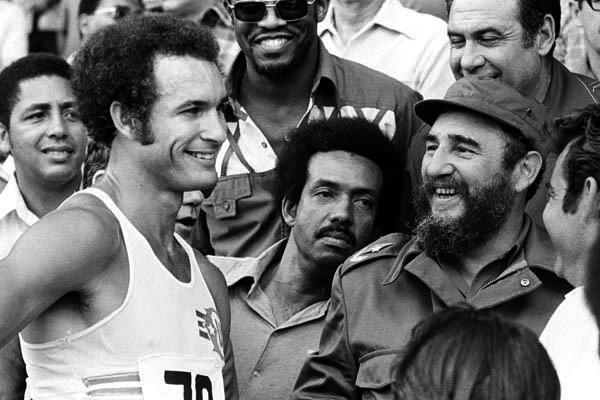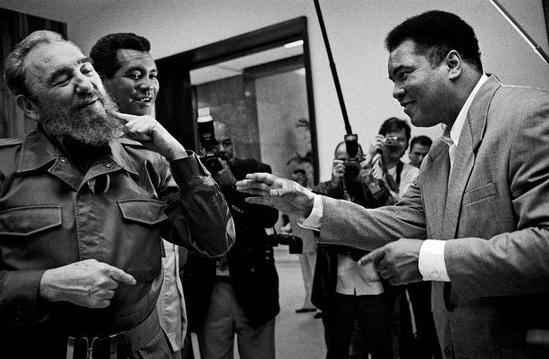
On more than one occasion he said that he became a revolutionary by reading the history of the French Revolution and under the influence of that glorious epic. As a teenager and son of a landowner, at night, while his parents slept in the so-called veranda of the house, he dreamed of doing something that would change the destiny of his homeland in the first floor, in the room he shared with his brothers Ramón and Raúl.
"In Cuba we need many Robespierres. No one has the slightest doubt that there were, there are, and that, not by chance, Robespierre was called the incorruptible," he wrote to Angel, his father, when he was in prison on the then Isle of Pines, for the actions of the assault on the Moncada Barracks, on July 26, 1953.
From that deed, Fidel sprouted a projection, a social program, of which sports is one of his great achievements. The goal was not achieved on that morning of Santa Ana, nor was it achieved by Mijaín López in his first "assault" on the Olympic Games in Athens 2004.
But if we could call those attempts setbacks, they returned them to us as victories: the Revolution and Mijaín became invincible.
The Chief of that work of the people, which, to paraphrase Christopher Columbus, is the most human and beautiful ever conceived by a human being, made a path emerge from that deed, a social program that has had in sports a clear expression of that perspective.
"If before Castro medals had been won in two Olympic disciplines (fencing and canoeing), after him medals were won in 15 sports." This is not an observation from Granma or Cuban Television, but from ESPN, the prestigious American network, world leader in sports.
Fidel was an athlete. His steps on the basketball courts at the Colegio de Belén; his Juantorena-like strides on the university track, where, by the way, he won the unprecedented double (400 and 800 meters) of the elegant track; his immersions in underwater fishing, and even a fierce boxing match, with his brother Ramón as trainer, led him to interpret the athletic world and to understand its protagonists.
Friend of great personalities of the exciting sports universe, such as Juan A. Samaranch, president of the International Olympic Committee; of Mohamed Ali, world champion of professional boxing; or of Diego Armando Maradona, world champion of football, he had a clear idea of the phenomenon that is lived behind the courts and of who the real heroes are.
"Olympic revenues are the fruit of the efforts of athletes from all countries. Without them there would be no Olympics and there would be no revenue," he said.
Without fear of being absolute, nobody like him defended the rights of the youngest in the Olympic Games, and even launched, on their behalf, Cuba, in 1999, as a candidate to host the 2008 edition.
At that time, he stated that "five countries among the richest in the oecd: United States, Germany, France, United Kingdom and Australia, with a population of 491.5 million inhabitants, equivalent to 8.3 % of the world population, have hosted 12 Olympic Games, 52.2 % of the 23 games held," and added that "those countries, the Group of Seven, the richest of all, which together account for almost 70 % of the gross world product, have been particularly privileged in terms of being awarded Olympic venues."
Those candidacies, even when they did not crystallize because, as he himself denounced, Cuba would never enter into an auction of promises to the highest bidder, out of principle, and because it had nothing else to offer but its example and the organizational capacity of its people, did raise the voice of the Third World, of those who have the least, who, unfortunately, are the majority.
As a full-fledged revolutionary, nonconformity never ceased to summon him. The small island was an insignificant point on the world sports map, until he decided, on January 29, 1959, only two weeks after creating the General Directorate of Sports, and less than a month after the revolutionary victory, that it was necessary to take that activity as far as possible. He not only promoted the programs aimed at that purpose, but also accompanied their execution. He was one more on the path to the world and Olympic podiums.
And the dream came true. Almost at the age of ten, a Cuban was a world record holder for the first time. In 1971, Pedro Pérez Dueñas took the world record in the triple jump to 17.40 meters. From that moment on, and a little earlier, Cuba has won world medals in 20 disciplines, and in 15 it has reached the Olympic podiums.
Feats like those of Teófilo Stevenson, Juantorena, Mireya Luis and Regla Torres, along with their volleyball teammates, and Javier Sotomayor, have never been repeated.
Here, in Paris, Mijaín López put Fidel and his strategy on the top of the podium, with his fifth consecutive gold medal, an X-Files event, something paranormal. It will be a long time, maybe all the time, before another human being can enter the Cuban temple where the Pinar del Río native of the small town of Herradura dwells.
Today, the Commander-in-Chief said to this delegation, about to fulfill his task here, the same thing he said to those: "I pay tribute to that virtue, to that quality, to that shame of our athletes. Of no other country are so many complimentary things said as those that are said about Cuban athletes. The people admire their athletes and do not despise them for any setback."
But he, who did not hide to say that he would have liked to be one of them, would also have made the same reflection he made on August 24, 2008, after the Beijing Games, in which he pointed out that those merits of our sport "do not exempt us in the least from present and future responsibilities."
As a result of the results of these 33rd Olympic Games, we will receive, as he said and as he always did, our athletes with or without medals.
On this August birthday, from sport, we must evoke him with that demand from which his teachings were derived.
"We have rested on our laurels. Let's be honest and let's all acknowledge it. It doesn't matter what our enemies say. Let's be serious. Let's review every discipline, every human and material resource that we dedicate to sports. We must be profound in our analysis, apply new ideas, concepts and knowledge.
That is the path he showed us. Let us return to it under the sacred principle that, for honor, is the gold medal.







